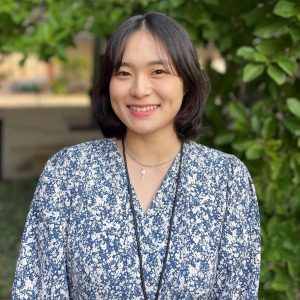UW–Madison graduate student Chaeyeon Kim received the award for Best Doctoral Colloquium Paper at the 11th International Conference of the Immersive Learning Research Network (iLRN) in June.

Kim’s paper, “A Comparison of Teachers and Students in Categorizing and Representing Geometric Conjectures using AR Simulations,” investigates how high school geometry teachers and students use augmented reality (AR) to explore mathematical concepts. The study found that teachers were more likely to emphasize the underlying structure problems when engaging with AR, while students tended to focus on visible or surface-level elements. Teachers also demonstrated a stronger ability to connect hands-on AR interactions to formal scientific or algebraic ideas.
The findings highlight the potential of AR and other mixed reality tools to support mathematical learning — and point to a need for further research on how to thoughtfully design of these immersive learning environments to help students engage with higher-level mathematical concepts.
Kim, a PhD student in Learning Sciences within the School of Education’s Department of Educational Psychology, is the lead author of the paper. Her collaborators include:
- Michael Swart, a researcher in the Wisconsin Center for Education Research;
- Joel Beier, Matthew Grondin, Doy Kim, and Fangli Xia, all PhD students in educational psychology in the Learning Sciences area at UW–Madison — Grondin is also studying mechanical engineering; and
- Mitchell Nathan, Vilas Distinguished Achievement Professor of Learning Sciences and chair of the Learning Sciences graduate program in the Department of Educational Psychology.
“We are seeing a lot of technological innovations that have tremendous potential to transform educational experiences,” says Nathan. And yet, he adds, “we must be cautious that the benefits of these technologies are often not self-evident and require careful research to understand the ways that teacher instructional practices and student learning behaviors must be adapted to realize these potentials. This work is a critical step toward making these transformational changes a reality.”
Kim describes the award as personally meaningful, and notes how it will help advance her research: “(The award) means a great deal to me, as I have a strong passion to contribute to immersive learning research,” Kim says. “The iLRN community’s recognition gives me more confidence in the value of my research direction and motivates me to continue advancing studies in this area. I hope to keep contributing to this conference and community in the future.”